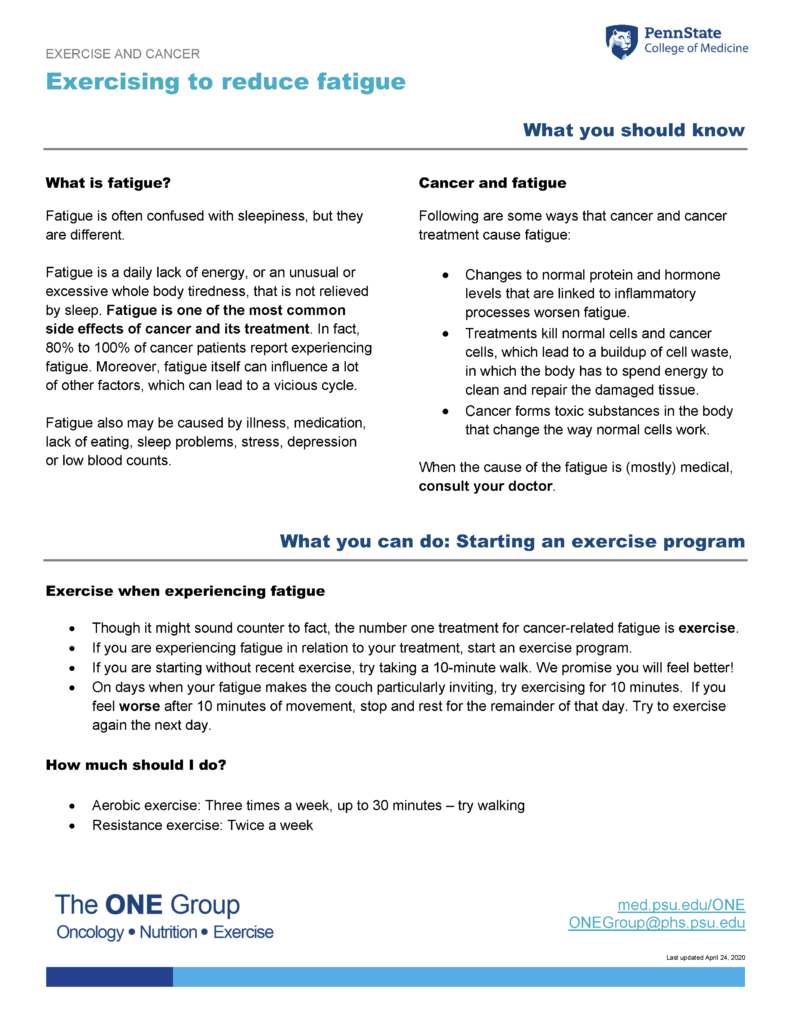Learn about exercising to reduce fatigue in people with cancer in this guide from The ONE Group (Oncology – Nutrition – Exercise) at Penn State College of Medicine.
Jump to topic
Search
What you should know
What is fatigue?
Fatigue is often confused with sleepiness, but they are different.
Fatigue is a daily lack of energy, or an unusual or excessive whole body tiredness, that is not relieved by sleep. Fatigue is one of the most common side effects of cancer and its treatment. In fact, 80% to 100% of cancer patients report experiencing fatigue. Moreover, fatigue itself can influence a lot of other factors, which can lead to a vicious cycle.
Fatigue also may be caused by illness, medication, lack of eating, sleep problems, stress, depression or low blood counts.
Cancer and fatigue
Following are some ways that cancer and cancer treatment cause fatigue:
- Changes to normal protein and hormone levels that are linked to inflammatory processes worsen fatigue.
- Treatments kill normal cells and cancer cells, which lead to a buildup of cell waste, in which the body has to spend energy to clean and repair the damaged tissue.
- Cancer forms toxic substances in the body that change the way normal cells work.
When the cause of the fatigue is (mostly) medical, consult your doctor.
What you can do: Starting an exercise program
Exercise when experiencing fatigue
- Though it might sound counter to fact, the number one treatment for cancer-related fatigue is exercise.
- If you are experiencing fatigue in relation to your treatment, start an exercise program.
- If you are starting without recent exercise, try taking a 10-minute walk. We promise you will feel better!
- On days when your fatigue makes the couch particularly inviting, try exercising for 10 minutes. If you feel worse after 10 minutes of movement, stop and rest for the remainder of that day. Try to exercise again the next day.
How much should I do?
- Aerobic exercise: Three times a week, up to 30 minutes – try walking
- Resistance exercise: Twice a week
Other practical tips for fatigue
- Prioritize your daily activities.
- Rest is important. Try to take rest breaks or a few short naps during the day. Planning your day in advance might help. Try to balance rest and activity so that it doesn’t interfere with nighttime sleep.
- Stress can make fatigue worse. Ask your cancer care team about stress management.
- Ask for a referral to a physical therapist. They can help with a more personalized rehabilitative program.
Where can I find more information about aerobic and strength-training exercises?
If you are interested in starting aerobic and/or strength-training exercises, The ONE Group (Oncology – Nutrition – Exercise) provides videos demonstrating proper form for more than 50 exercises.
Notes
Contact your physician if:
- There’s a medical cause for your fatigue; there may be treatment for it.
- You are considering using related medications.
- You experience unintended weight loss.
References
- American Cancer Society
- American College of Sports Medicine Moving Through Cancer initiative
- American Institute for Cancer Research
- National Cancer Institute

